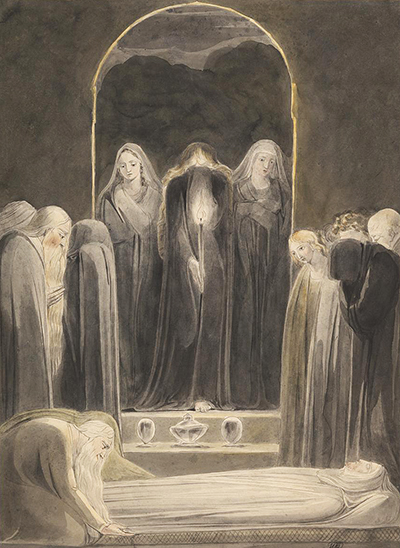William Blake painted The Entombment. The artwork represents the body of Christ laid on a bier at his tomb. Nicodemus is at his feet. Beside him are other mourners, one with her face turned away from the others. Heads are bowed in a sense of regret, sadness, and melancholy.
The painting is usually displayed at Pollok House in the Prints and Drawings Room. The public can access the venue. The medium used is ink and watercolor on paper. The dimensions of the painting are 41 by 30 cm or 417 by 310 mm. At the entrance of the tomb are three lady mourners all in black cloaks. The one central to the other two holds a lit candle, her face is covered by the hood of her cloak. There is a visible staircase like platform just next to the three ladies at the entrance of the tomb leading to where Jesus is laid. On top of the step are three items, presumably bearing the mixture of myrrh and aloes weighing about 75 pounds which Nicodemus brought with him. Virgin Mary is in a black hood and cloak, next to St. John, standing near Jesus' head. The body of Christ is wrapped in linen in accordance to Jewish customs.
The painting conveys the Passion and Resurrection of Christ. It depicts the emotion behind the written narrative in the scriptures. It makes the grief of those who cared for Christ in a world full of people who turned against him tangible. And it presents the full extent of his suffering. The painting was one of Graham Robertson's collection of William Blake's artworks. He was a painter, theatrical designer and writer. He was popular for being a collector of Blake's work. The entombment was part of his Christie's 1949 Sale after Graham Robertson's death in 1948.
The style used for the painting was symbolism. Symbolist painters created art representing emotions created by happenings and not the events themselves. They went over the boundaries of realism or logic to capture the element of emotion. The art draws from the real events because without them, there would not be any emotions. There is meaning in the choice of clothes, the black cloaks, the bowed heads, the candle, the positions of the mourners at the body of Christ's head and feet, and Nicodemus on his knees attending to him. It acknowledges the presence of the souls and spirit and the role they play alongside the physical aspects visible to everyone.




